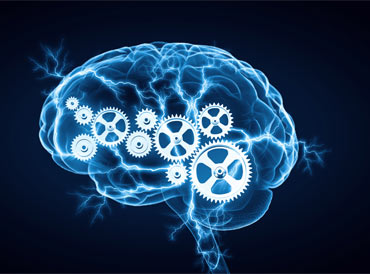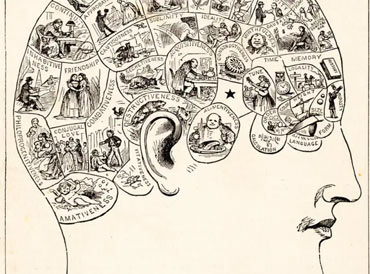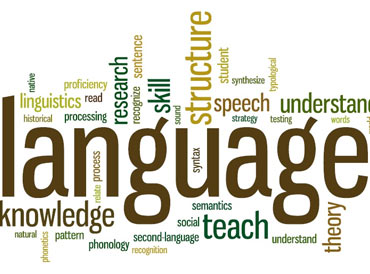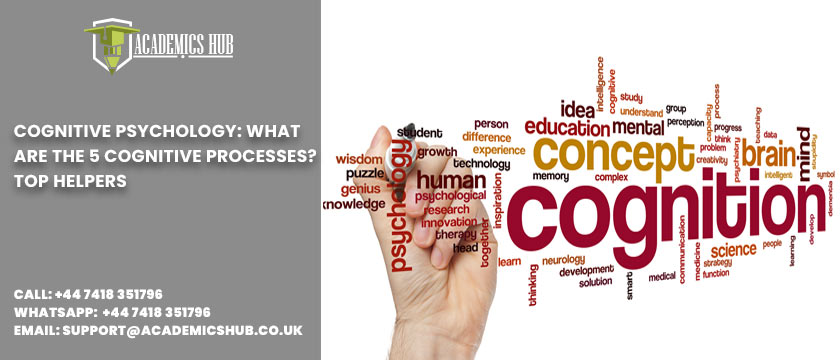Because we can only perceive the world through our own eyes, some people may take thinking, feeling, and imagination for granted. In actuality, cognitive processes enable us to form communities, societies, relationships, and jobs, among other things. And the scientific study of such cognitive processes and the mind as an information processor is known as cognitive psychology. It has to do with how we process information from the outside world and how we make logical sense of it. Cognitivists take a cognitive approach and strive to create cognitive models of how people’s minds process information, such as vision, memory, language, thinking, and consciousness. Many parallels exist between cognitive psychology and cognitive neuropsychology, which is largely concerned with the impact of brain injury on cognition, and, to a lesser extent, computational neuroscience, concerned with creating computational models of brain function.
The study of our inner mental cognition, perception, memory, decision making, and language is known as cognitive psychology. Each of these elements plays a critical role in shaping who we are and how we act. The thoughts associated with these concepts can be conscious or unconscious; for example, we might deliberately try to concentrate on a lecture, but the light flashing in the room could cause a non-conscious shift elsewhere.
The psychology students get to learn about the cognitive approach processes and methods. They get psychology assignments that are often tricky and technical. This is why psychology students look for professional assignment helpers and the best psychology homework help online.
Cognitive Psychology
The scientific study of human cognition, or all of our mental capacities, such as perceiving, thinking, reasoning, learning, remembering, and understanding, is known as cognitive psychology. The word “cognition” is derived from the Latin “cognoscere”, which means “to know.” Cognitive psychology is the study of how people acquire and use knowledge or information. Computer science, artificial intelligence, philosophy, anthropology, linguistics, biology, physics, and neuroscience are all influenced by this highly interdisciplinary cognitive science. Individual components of cognitive processes can be understood, and inner mental processes can be described in terms of rules or algorithms in information processing models.

Cognitive psychology is based on two assumptions: (1) human cognition can at least in principle be fully disclosed by the scientific method, that is, individual components of mental processes can be identified and understood, and (2) internal mental processes can be described in terms of rules or computation in information processing models. There has been much debate on both approaches till now.
Cognitive psychology focuses on what appear to be low-effort cognitive tasks in order to understand human cognition better. The scientific community commonly believed in the 1800s that the mind could not comprehend the mind. Wilhelm Wundt established the first laboratory dedicated to systematically investigating the mind in the late 1800s. The term “structuralism” was coined to describe his approach. His audacious goal was to create a periodic mental table that included all of the sensations needed in the creation of each experience. However, when John Watson proposed a new psychological paradigm known as behaviorism, the use of analytical introspection to expose underlying mental processes was gradually abandoned.
The Top Five Cognitive Processes in Cognitive Psychology
Cognitive Processes
Cognitive processes are a set of electrochemical impulses in the brain that allow you to understand and learn about your surroundings. Neurons emit substances that cause electrical signals to be generated in adjacent neurons, resulting in a flurry of messages that are translated into conscious and unconscious thoughts. Cognition includes the conscious interpretation of your five senses, procedural knowledge, and emotional reactions.
Attention
It’s difficult to conceive a world in which attention does not play a critical part in how we interact with our surroundings, yet we fail to take it into account. Attention is most active when driven by an individual’s expectations or goals, which is known as top-down processing in cognitive psychology. On the other hand, Bottom-up processing is more passive when directed by external stimuli such as a loud noise. In cognitive processing systems, attention solves the problem of information overload by selecting some information for continued processing or by managing resources applied to multiple sources of information at the same time.
Perception
Touch, sight, smell, taste, and hearing are the five senses that humans use to perceive the world. Because we often deliberately and unconsciously interpret information received through our senses, we generate thoughts, opinions, and emotional reactions; perceptions are a cognitive process. For example, the scent of a particular flower may evoke memories of a specific person and a nice recollection, or you may recall an old memory when you hear a certain name.
According to research, perception, like attention, appears to include bottom-up and top-down processing. Bottom-up processing involves neurons firing in reaction to specific features of a picture, such as a nose, brows, jawline, and so on. Top-down processing explores how a person’s prior knowledge influences their perspective.
Bottom-up processing explains why, when two persons are confronted with identical stimuli, their perceptions differ as a function of their expectations and prior knowledge. In cognitive psychology, combining bottom-up and top-down processing allows an individual to make meaning of both static and moving visuals when minimal information is available.
Memory

One of the most researched cognitive processes in cognitive psychology is the potential and fragility of human memory. Memory research examines how memories are formed, kept, and recovered. Memory for information, procedures, or abilities, as well as working and short-term memory capacity, have been functionally differentiated. Experimental methods have found dissociable memory types or processing systems with limited capacities, such as short-term or working memory. Memory is described in computational terms as propositional networks, holographic or composite representations, and retrieval procedures. Separable brain areas active during storage or retrieval from various processing systems are identified by brain imaging and lesion studies.
Information that you experience is immediately stored in your short-term memory, and much of it eventually becomes long-term memory. Memory formation, storage, and recall are fundamental components of cognition that allow people to demonstrate most of their intellect. For example, one may remember his own birth date without needing to think about it, but recalling the birthdate of anyone else may entail some intellectual effort.
Thought
Any cognitive activity that occurs within your conscious mind but that you do not say aloud or convey through any bodily manifestation is referred to as a thought. Humans may express complicated thoughts using the “inner voice,” which is a verbalized language that only exists in our heads. Thoughts include decision-making, problem-solving, and deductive and inductive reasoning. Human judgment and decision-making are pervasive; voluntary conduct requires judgment and choice, whether implicitly or overtly. Beginning with anticipated utility theory, the historical underpinnings of choice are built on normative or rational models and optimality criteria. The decisions which humans make are rational and can reflect their cognitive approach.
Language
Cognitive psychology has concentrated on language acquisition, language comprehension, language creation, and the psychology of reading, while linguistic approaches have focused on the formal structures of languages and language use. Encoding and lexical access to words, sentence-level parsing and representation, and generic representations of concepts, gist, inference, and semantic assumptions have all been explored in psycholinguistics.

Understanding language, whether written or spoken, necessitates a significant degree of multi-level processing. The first step in comprehension is to examine the structure of the sentences. In addition to processing syntax (the rules for constructing and evaluating phrases), semantic analysis is required to determine if the interpretation should be literal or include irony, metaphor, or sarcasm.
Fluid intelligence allows people to learn languages far more quickly earlier in life. The ability to learn new information quickly is known as fluid intelligence, whereas the ability to recall and apply gained information is known as crystallized intelligence. Fluid intellect declines as we age, while crystallized intelligence rises. The use of a large vocabulary, for example, is a cognitive process facilitated by crystallized intelligence and is widely studied in the field of cognitive psychology.
Examples of Cognitive Processes
Dreaming
Humans have active sensory perceptions in their dreams, which include depictions of real-world and imagined settings. We may conjure up such scenes from our memories, or the information we receive in dreams may come from another source. According to brain scans, human brains are very active during REM sleep, the part of sleep when dreams occur.
Doing Homework
Homework is an example of cognition involving conscious thought, attention, and memory. Intensive uses of cognition include recalling facts gained in class and reading offered materials to learn more about school subjects. For example, you might recall how to solve a math problem but want to double-check your solution by reading a section of your textbook.
Driving A Car
Driving is another example of procedural knowledge or cognition that occurs without conscious memory. Riding a bike is another case of procedural knowledge. While driving, you are aware of inputs such as other automobiles on the road, but once you have mastered the skill, you store the actions in another unconscious area of the brain that activates automatically when you start your car. You don’t have to recall it again and again.
Final Thoughts
Although cognitive psychology’s dominance was not to persist indefinitely, it remains a prominent topic in modern psychology research. Each cognitive approach advances, resulting in better ideas that help us move closer to a more objective and accurate understanding of human psychology. While scientific thinking and ideas have progressed beyond the rigorous dichotomous dogma of cognitive or behaviorist schools of thought, the new discoveries made along the road are still extremely useful when considering the mind, brain, and behavior.
According to cognitive psychology, attention, perception, cognition, memory, and language are five cognitive processes that define a person’s behavior and personality. These five approaches mentioned above explain how a human mind works and how cognitions are formed. Psychology students often find psychology assignments difficult, and so they seek professional assistance from the best assignment helpers in the UK. As cognitive psychology is a complicated and extensive science, it needs to be learned and understood keenly in order to fully grasp the concepts and cognitive theories.
